The Google Pixel C Review
by Brandon Chester & Joshua Ho on January 25, 2016 8:00 AM ESTGPU Performance
Even to this day, Tegra K1 has held the crown for best GPU performance in a mobile Android device. From one point of view this is quite impressive, as it shows how NVIDIA was able to build a GPU that no other SoC vendor apart from Apple was able to beat. From another point of view, it's quite concerning to see that nobody apart from Apple values GPU performance enough to try and beat NVIDIA's chips.
Being an NVIDIA SoC, Tegra X1 is paired with a GPU designed in-house by NVIDIA. More specifically, it’s a 256 core part based on their Maxwell architecture. We’ve already seen how this GPU performs in the SHIELD Android TV, but due to being battery powered and having stricter thermal constraints, there will obviously be differences in performance between it and the Pixel C. In this case, it appears that the GPU is also running at a lower frequency than the SHIELD Android TV. While it has been estimated that the SHIELD Android TV's version has a peak GPU frequency of 1GHz, I believe the implementation used in the Pixel C has a peak GPU clock of approximately 850MHz. It’s also worth noting that the Pixel C uses the open source Nouveau kernel drivers that differ from NVIDIA’s kernel drivers on the SHIELD Android TV and SHIELD Tablet K1, and it doesn’t have full OpenGL support which has been the case with Google’s previous Tegra-powered devices as well. With all that in mind, lets dive into our standard mobile GPU test suite to evaluate the GPU performance of the Pixel C.
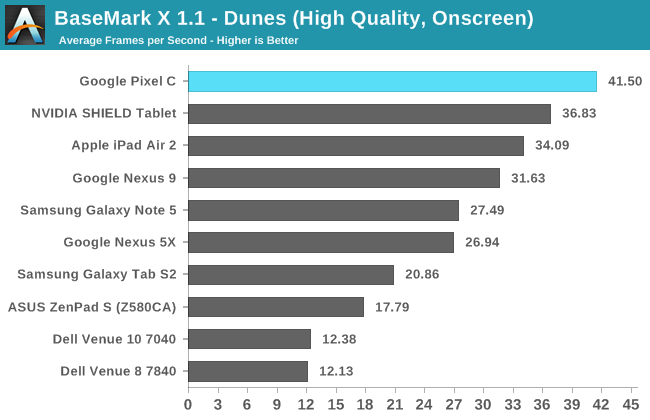
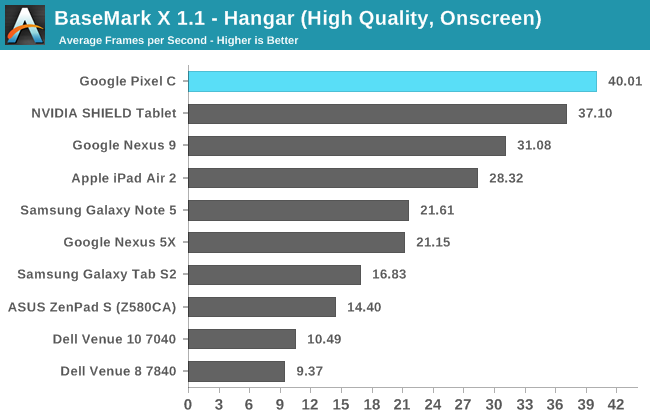
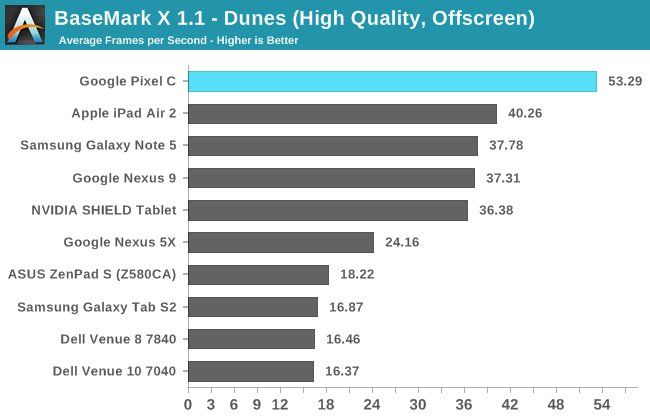
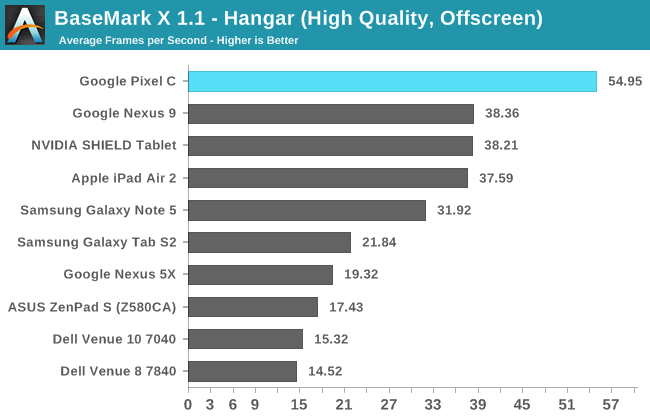
There's not a whole lot to be said about the Pixel C's performance in BaseMark X beyond saying that it's faster than any other Android device by a large margin. Even in the on screen tests, the Pixel C with its substantial resolution is still the fastest device on the charts. Absolute GPU performance as shown in the off screen tests shows a 43% performance improvement over the Tegra K1 used in the Nexus 9.
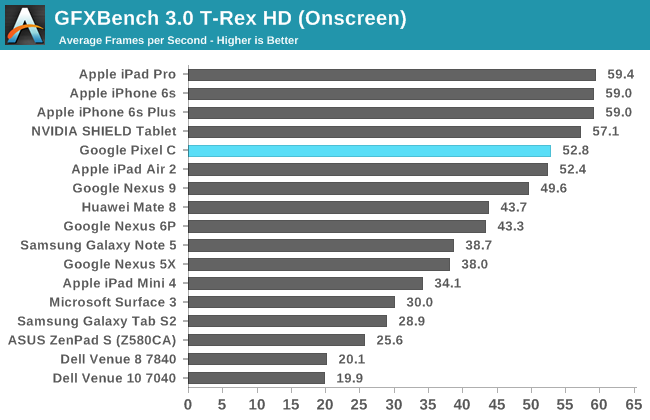
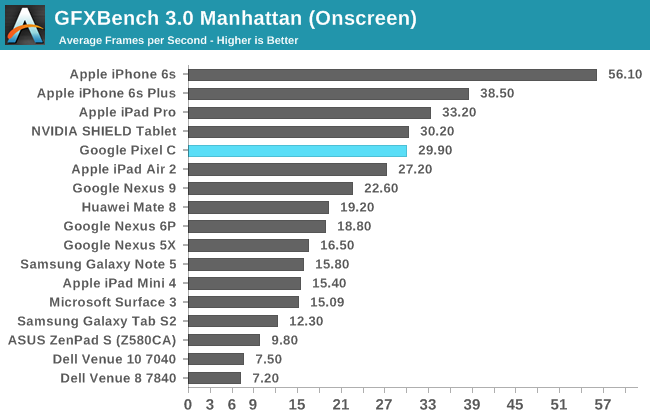
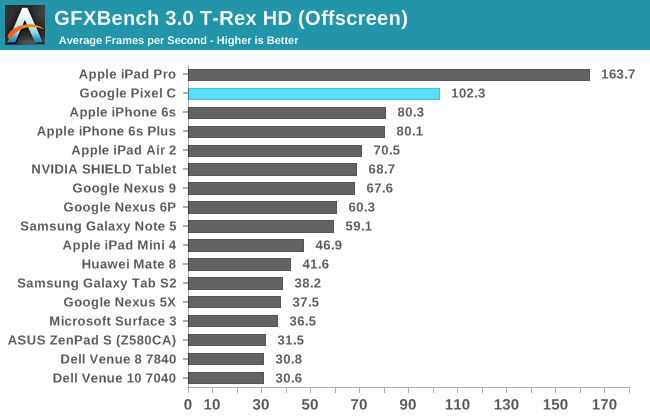
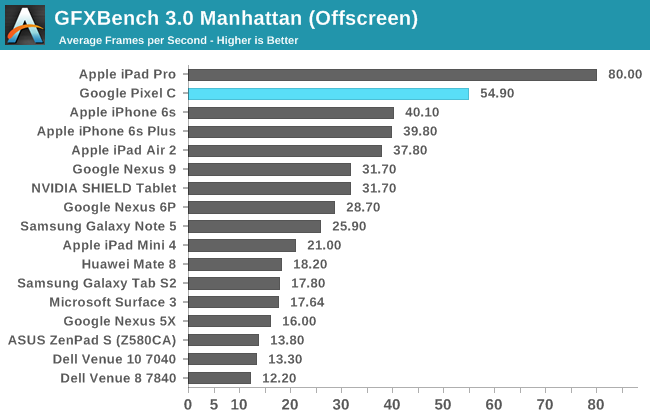
In GFXBench's T-Rex on screen test the Pixel C comes very close to hitting the Vsync limit despite its relatively high resolution. Off screen performance in both T-Rex and Manhattan is exceptional, and both tests make it clear that the Pixel C has the most powerful GPU in any mobile Android device. The gap between it and the next fastest device is quite large too, and the only tablet that can beat it is the iPad Pro with its A9X SoC.
The GPU performance of the Pixel C is unparalleled in the Android space. Not only that, but it ends up being faster than any similarly sized tablet, including the iPad Air 2 and of course the Nexus 9. It’s certainly impressive, and while I don’t mean to take away from the achievement, I can’t help but wishing that we had seen Tegra X1 come to market a bit sooner. Beating out A8X and Tegra K1 is great, but the former of those SoCs is also now well over one year old. While comparing to the iPad Pro is unfair in some respects due to the size difference, both devices do sell themselves as tablets priced for productivity, both launched at around the same, and NVIDIA’s GPU isn't as fast as the one in A9X. That being said, at $799 the iPad Pro is also significantly more expensive than the Pixel C, and relative to its price the Pixel C offers amazing GPU performance. The only concern would be if A9X shows up in some sort of regular sized iPad priced at the same level as the Pixel C. While I certainly do wish we could have seen Tegra X1 in some sort of tablet a bit earlier in the year, right now it does stand as the chip with the fastest GPU to ship in a standard size tablet, and I don’t think it will disappoint even when playing the most intensive 3D games.
Storage Performance
Something that hasn't been investigated very thoroughly in the past is smartphone storage performance. However, among high end devices this is now becoming a point of differentiation. Apple has moved to their own storage solutions that use NVMe and run over PCIe, while Samsung is pushing forward with UFS 2.0. While the Pixel C is a premium tablet, it ships with a standard eMMC storage solution. It also has Google's disk encryption enabled, which has been shown to impact storage performance in the past.
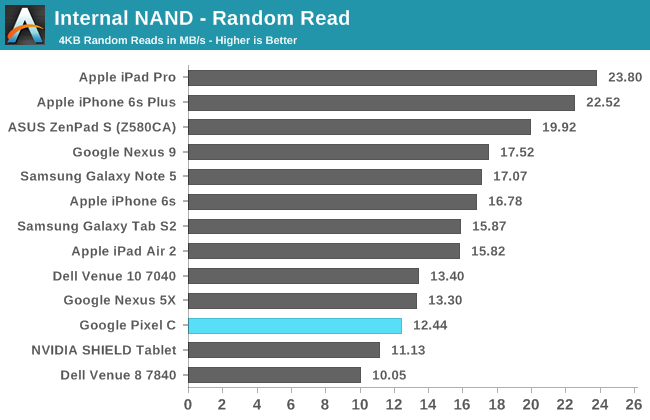
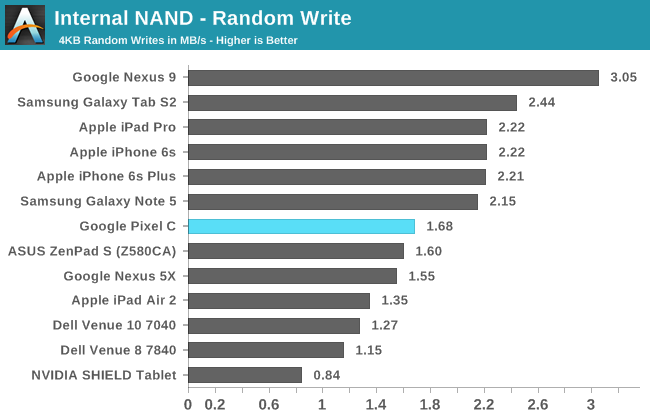
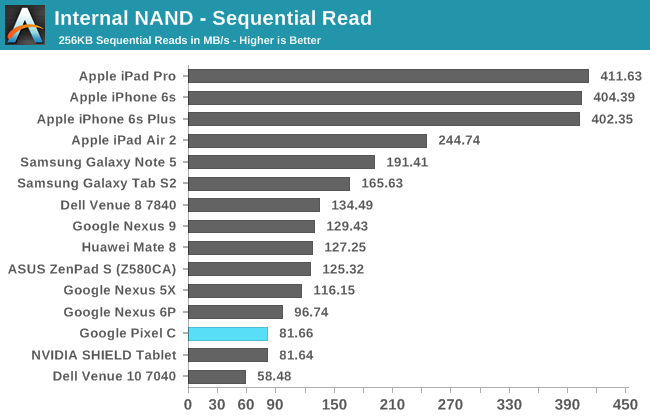
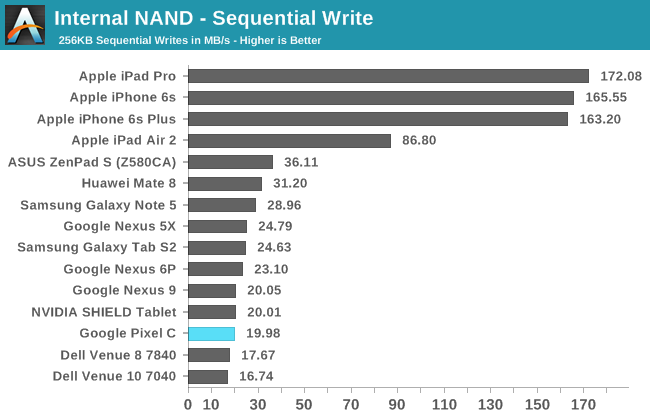
Like every Android device that Google has been involved in developing, the Pixel C doesn't fare well with our storage performance tests. Random reads and writes decent, although not competitive with new storage solutions like the SSD in the iPhone 6s and iPad Pro. Sequential speeds are simply not good at all, and definitely not competitive with what you'll get in an Apple device from the past two years or anything with an unencumbered and halfway decent eMMC or UFS storage solution. There's not much point in going over this issue again, because at this point it's clear that Google doesn't consider storage performance to be a metric worth competing on. I think it is, and I think that users end up appreciating the benefits of faster storage through quicker app installations, less loading when working with large files, among other benefits, even if they don't know what's driving those improvements behind the scenes. It's definitely something to think about when considering the Pixel C as a tablet, especially if you have a productivity focus.










122 Comments
View All Comments
ImSpartacus - Wednesday, January 27, 2016 - link
You're paying for something that "just works". You'd be surprised at how attractive that is for a lot of people that are simply incapable of using modern tech.So you can either stick your fingers in your ears and demand that everyone spend years of their life becoming experts in modern tech, or you can realize that there's some money to be made. Apple is in the business of making money.
Alexey291 - Saturday, January 30, 2016 - link
No offence to your and your expertness. But do you honestly think that it takes "a few years" to become an expert of playing with touchscreen devices?Oh boy...
jbelkin - Monday, January 25, 2016 - link
Well, not ignorant, just an economy that only supports 9% of buyers being able to afford the stnadard bearer.Vlad_Da_Great - Tuesday, January 26, 2016 - link
@jbelkin. EU are not as shallow and easy to manipulate as their USA counterparts. Also, biggest % of iPhone purchases in USA are done from people over 60y old. If you look around the globe the second biggest country with huge engineering population (India) has no interest in the iPhone.Asians on the other side love magic, that is what APPL is good of selling.
vanilla_gorilla - Tuesday, January 26, 2016 - link
That's mostly related to income. The vast majority of those people would much prefer an Apple device if they could afford it. Most Android devices are incredible cheap devices.the_comment_guy - Tuesday, January 26, 2016 - link
What are you talking about? Apple hasn't been ableto open stores in India due to their laws requiring 30% of their components to be sourced from small to medium enterprises: that's why they've barely made a dent in the Indian phone market. Despite this, Apple's sales in India have been increasing every year. If India relaxes its backwards laws, and Apple is allowed to open their own stores, Apple sales will explode.Alexey291 - Saturday, January 30, 2016 - link
Sure the sales have grown in india. Shame about the sales in the rest of the world.Essentially last quarter's sales have been propped up by the Chinese and Indian sales growth. The rest of the world however...
akdj - Thursday, February 4, 2016 - link
Rest of the world? As in North, South America and a dozen European countries? Apple's BLOWN their OWN records out of the water with iOS device sales. iPads are down ...unfortunately for Apple, they're built too well! Seriously, as I've owned each iPad ...we use them with our business and both original and iPad 2s are still BOTH working & battery life on the first iPad continues beating a dozen hours watching movies. Eight browsing or a good 25-30 listening to music, screen off!My iPad '2' purchased on launch day and the kids use it all the time. No issues ...they're replied amid don't die. Apple is continuing support for older devices. Kicking their own selves in the sack! Or ...maybe not.
While geeks like me justify with my job, personal business and personal 'wants' the purchase of each new iPad that drops, and because of each gen's phenomenal updates. iPad 3 aside, which I owned until 4 dropped - iPad 3 left on Craigslist the following day with its updated performance so obvious. The 'new' iPad 3, IMHO, is the only anomaly to the updates and performance increases, display/resolution updates, shaving weight, maintaining battery life and dramatically boosting its 'guts', sensors, display accuracy and smaller but significant user bonuses like the A/G display stack and their lamination & out of factory calibration ....make each iPad, in my line of work, play & education priceless! Original to iPad 2, the difference was/is obvious. 2-->3, 'Retina' on the iPad, a complete game changer. Oops, same engine as the iPad 2, 4 times the resolution, drop the 4 with its Apple designed SoC monster A8X --- exponentially bettering the iPad w/Retina experience!
While somewhat less Ferrari, more Subaru ...Air 1 is today a fantastic tablet (I've both Air 1 & 2). It's slower than its younger sibling but its sporting the first 64bit processor in a tablet and mine continues to get a lot usage. My Air 2, there's nothing on the market comparable. Not w/the App Store and its million optimized, all inclusive app/software accompanying options to aggregate and integrate with the home Mac, studio Macs or your phone/tab with Handoff. The continuity Apple's built into iOS and OS X as well as supporting older devices with both desk OS's, it's no wonder folks aren't replacing them as quickly as a phone! They're still selling a quarter more than the rest of the field does in a year! When you take the <$149 tablet choices off the table, iPad in its slump is outselling the entire industry 2-1 quarter vs. year! It's a top 100 in the Forbes 500 business itself! That's crazy IMHO. But the addition of iPad Pro changes things. Doubling the RAM on the iPhone 6s & iPad Air 2 was obvious in use, day to day ...it was just a LOT quicker at everything than my Air 1. They've now doubled to 4GB in iPP and as an owner for 3 months, I've never been happier with an iPad. The iPad A2 still ROCKS! I use it daily and it's as robust and reliable as any predecessor, just a helluva lot faster and finally now, finally being targeted by developers to take advantage of the hardware...as older products are phased out
Which left me curious about Josh's final comment/words
'Overall, I’m not even sure this measures up to the iPad Air 2 which is well over a year old by this point. I cannot in good conscience recommend anyone buy this tablet until the touch screen issues and generally poor performance has been resolved, and even then that recommendation would be to a limited group of people solely interested in a touch-only Android tablet.A
I read the review a second time all the way through. I went back and read the Air 2 review as well. While a couple of benchmarks seem to have parity or even exceed A2's --- the display performance, also beating A2, it's close in your measurements but EVERY other word strongly suggests not just an inferior experience in comparison (Pixel v A2), but performance destroyed by my iPad 4! Janky, unable to maintain connection, freezes and crashes and.... I can go on, it's not necessary though. Just seems to very much understate iPad A2's performance and without reading the rest, complete overstatement of the 'experience' of PixC as a couple of benches close, neck & neck, means absolutely nothing when it comes down to the user's overall experience. My iPad 2 seems to be a better comparison!
Yikes
lilmoe - Monday, January 25, 2016 - link
Nice ignorant comment bro. Way to go.id4andrei - Monday, January 25, 2016 - link
Hardware has nothing to do with Android's problem. Dev support for tablet operation in Android is lacking. Simple.